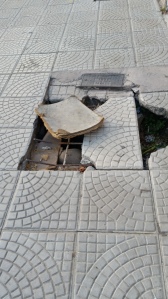
I was a little over an hour away from Dallas, where I’d planned to stop for the night, when three warning lights popped up on my dash.
Panic. I’m on an interstate surrounded by nothing but ranchland. I still had about another 10 hours of driving to get back to El Paso. Plus, it’s Friday night of Memorial Day weekend.
After pulling over to peruse my manual and check my engine, I offer a prayer to get somewhere safely. Then I decide to calm down. I decide to trust that whatever happens, it’ll be OK. And I let go of any expectation to make it back to El Paso tomorrow.
This is not a typical response for me.
Maybe it’s because I’ve been getting a lot of practice in learning to trust over these past several years.
Maybe it’s the effects of listening to CDs on Meister Eckhart and the art of letting go while taking this incredibly long roundtrip drive from El Paso to Virginia.
Maybe it’s because, from the beginning, this journey has been about ridding myself of what is unnecessary. Of letting go of attachments and outcomes. Of learning to say yes to what is in front of me.
And there’s no doubt it’s because of what I’ve seen and experienced along the way.
Days earlier I had emptied out the extra bedroom at a friend’s house where I’d stored boxes I couldn’t get to before leaving Virginia last January. Sorting through years of family photos and other memorabilia filled me with gratitude for the blessed life I’d had.
A life I couldn’t return to. No matter how appealing it seemed.
And appealing it was. Visiting friends who were settling into a simpler life with their husbands, their kids now grown and out of college, yet still living close enough for family get-togethers in the beautiful rural countryside of central Virginia – I’ll admit, it was attractive.
This physical emptying out, I realized, was a metaphor for the internal releasing and emptying that has been going on. An emptying of attitudes as well as possessions, of the way I would like life to show up. The way I would like things to be.
Like not having car issues on the interstate, for example. Or not having my husband die so young. Or living so far away from my son who’s remaining in Alaska for at least another year.
Yet I also saw how, the more I “empty myself out,” the more I have room for God. And for “the other.” Room for true listening. For opening to the grace that’s right here.

The next day, as I sat in the customer service area at the Dallas Sewell Subaru, waiting to get the news about my car, I pulled out a letter I’d received from Martin, a 27-year-old Mexican journalist who’d come here seeking asylum because his life had been threatened. He was stuck in the El Paso detention facility, awaiting the results of his case.
I’d begun writing to Martin, hoping to encourage and visit him soon. I was considering my response to his letter when I received a text from a friend in El Paso saying that Martin had been denied asylum for the second time! Losing hope, he’d decided to give up his case rather than appeal and remain in our prison-like system. That means he’ll be returning to Mexico where at least half a dozen journalists have been killed in recent months. His young life is surely in danger.
Suddenly my minor inconvenience is irrelevant. My calling to follow my heart clearer than ever.
It may be that every time I step out in faithfulness, I’m taking a risk. But my risks are insignificant compared to the risks taken by those I’ve accompanied, my brothers and sisters running for their lives. People who live in constant fear and danger.
Living with an open-hearted stance is not easy. I feel the pain of the other as I grow in awareness that my life is not about me.
But this is what I choose. And I need grace to succeed.
“Grace leads us to the state of emptiness, to that momentary sense of meaningless in which we ask, ‘What is it all for? What does it all mean?’ All we can do is try to keep our hands cupped and open. And it is even grace to do that.” Richard Rohr
I hope that I am being “emptied out” so that I can be filled with the very fullness of that grace.












 Pay attention to where you’re going. It’s one of the lessons I learned in Cochabamba.
Pay attention to where you’re going. It’s one of the lessons I learned in Cochabamba.







